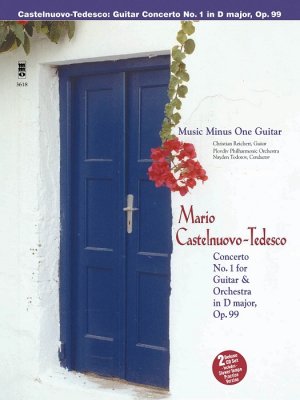

In 1926, Mario Castelnuovo-Tedesco premiered his opera La Mandragola, based on a play by Niccolò Machiavelli. Works by him were included in the first festival of the International Society of Contemporary Music, held in Salzburg, Austria, in 1922. Alfredo Casella also ensured that Castelnuovo's works would be included in the repertoires of the Societa Nazionale di Musica (later the Corporazione delle Nuove Musiche), granting him exposure throughout Europe as one of Italy's up-and-coming young composers. Mario Castelnuovo-Tedesco soon came to the attention of composer and pianist Alfredo Casella, who included the young composers work in his repertoire. After completing a degree in piano in 1914 under Edgardo Del Valle de Paz (1861-1920), well-known composer and pianist pupil of Beniamino Cesi, he began studying composition under renowned Italian composer Ildebrando Pizzetti, and received a diploma in composition in 1918. Castelnuovo-Tedesco was first introduced to the piano by his mother, and he composed his first pieces when he was just 9 years old. The resprected Italian composer and teacher, Mario Castelnuovo-Tedesco, was descended from a prominent banking family that had lived in Florence since the expulsion of Jews from Spain in 1492. Campogrande has set four texts – also in Latin – by the contemporary poet Marco Vacchetti, who was in turn inspired by Renaissance-era nativities painted by Piero della Francesca, Caravaggio, Luini and Solari.Mario Castelnuovo-Tedesco (Composer, Arranger) Campogrande’s piece has a more positive outlook, celebrating motherhood in a commission from the guitarist on this recording, Nicolò Spera, to mark the birth of his daughter. Jappelli’s chosen text was written by the Roman philosopher Seneca, and addresses the concept of happiness, ending with a bitter reflection on human frailty. Everywhere, what shines through, to quote the composer, is a sense ‘of the Spanish lands: the parched Castile, the pale olive groves, the scent of the orange orchards in Andalusia and, along the coast, the sea which breaks at the shore with vibrations, almost, of a guitar.’ Receiving their first recordings here are Nulla Sors Longa Est by Nicola Jappelli (b.1975) and Materna by Nicola Campogrande (b.1969). The vocal writing is limpid, capturing the colours and contrasts of Lorca’s text, whether it is representing the placid flow of three rivers (Baladilla de los Tres Rios) with an incessant stream of semiquavers, or depicting Carmen’s dance through the streets of Seville with an elegant and slightly grotesque “Tempo di Seguidilla” (Baile). At the peak of his maturity in 1959 and in a burst of creativity, Mario Castelnuovo-Tedesco set to music seven poems by Federico García Lorca as a cycle, Romancero Gitano Op.152.

#Mario castelnuovo tedesco guitar full
Handled sensitively, however, the combination yields a seductive sound-world, full of mystery and imagination, tending in this trio of works to evoke a reassuring feeling of familiarity: there is balance, a sense of form, awareness, and respect for a past that is renewed while it nourishes the present. The technical challenging of balancing a choir singing at full volume and a guitar, renowned for its gentle sound, has tended to discourage composers from pairing these resources.


 0 kommentar(er)
0 kommentar(er)
